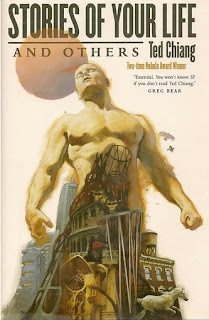
It's Episode 11 time! Julie and Scott discuss Stories of Your Life and Others by Ted Chiang.
From Rivets and Trees (by Scott):
In 1999, Gardner Dozois published the Sixteenth volume of his Year’s Best Science Fiction. I bought a digital copy for Handspring Visor from Peanut Press (now eReader) and started reading. Included in that volume was “Story of Your Life” by Ted Chiang, a story that affected me so much that it renewed my interest in short fiction. In first-person prose that refers to past and future as if it were all present, a woman tells the story of her daughter’s life while at the same time telling a fascinating story of attempts to unravel an alien language. How it converges is breathtaking.
A good Chiang story (and they are all good, as I found out) mixes the intensely personal with exciting science and philosophy. Stories of Your Life and Others includes all the fiction Ted Chiang wrote through 2002. Standouts other than the story I already mentioned: “Tower of Babylon” (building a tower to find God), “Understand” (a story that reminded me of “Flowers for Algernon” by Keyes), and “Hell is the Absence of God” (in which religious things are easily seen, yet a man struggles with faith).
I’ve heard so many times the refrain “I just don’t get into short fiction”, and that makes me sad because if you don’t read short fiction, you don’t read these incredible stories. I urge you to read Ted Chiang. Anything by Ted Chiang. It’s all gold.
Table of Contents:
“Tower of Babylon” • (1990) • novelette
“Understand” • (1991) • novelette
“Division by Zero” • (1991) • short story
“Story of Your Life” • (1998) • novella
“Seventy-Two Letters” • (2000) • novella
“The Evolution of Human Science” • (2000) • short story
“Hell Is the Absence of God” • (2001) • novelette
“Liking What You See: A Documentary” • (2002) • short story
Download or listen via this link: |Episode #011|
Subscribe to the podcast via this link: Feedburner
Or subscribe via iTunes by clicking: |HERE|
- Ted Chiang Interview at Fantastic Metropolis
- Ted Chiang Interview at StarShipSofa
- SFFaudio Ted Chiang page
- The quote about Hell that Julie was looking for from John Ciardi's essay about understanding Dante:
“The damned are there because they offended a theological system that enforces certain consequences of suffering. But part of that theological system has also decreed that salvation was available to all men. Christ in his ransom had procured endless mercy. One need only wish to be saved, need only surrender his soul to God in a last gasp of contrition, and he will be saved. He may have to suffer at length in Purgatory, but, once there, his place is reserved in Heaven and he will in time arrive there. Purgatory is like our modern colleges: no one can flunk out of them.
It follows then, that the only way to get into Hell is to insist upon it. One must deliberately exclude himself from grace by hardening his heart against it. Hell is what the damned have actively and insistently wished for.”